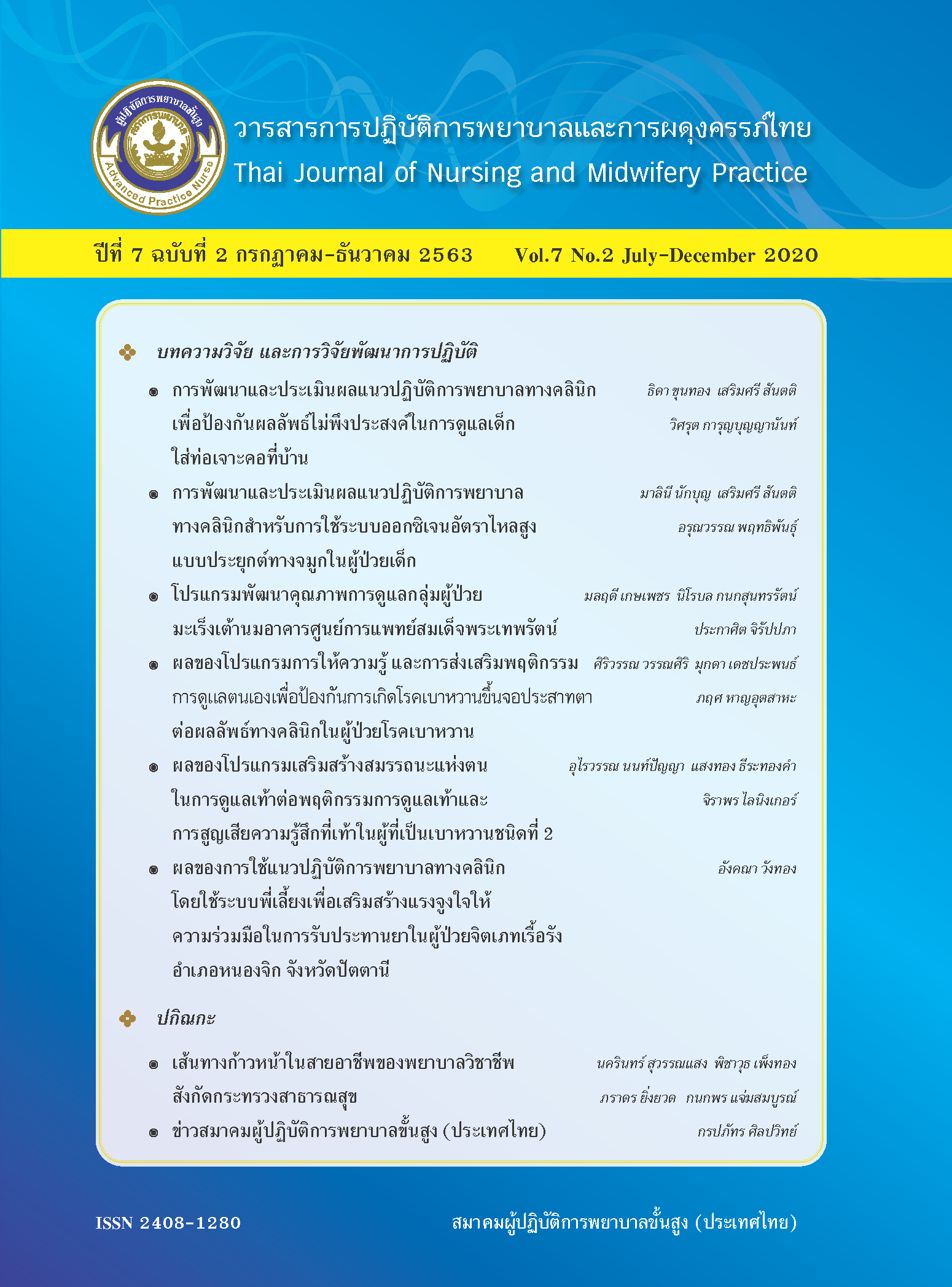Program to improve quality of breast cancer care at Somdech Phra Debaratana Medical Center
Main Article Content
Abstract
Abstract: This research aimed to study the program to improve the quality of care for breast cancer patients. The study was conducted during July–December 2018. The samples were 48 nurses and 49 breast cancer patients. The program was developed using Donabedian’s model and literature reviews as the conceptual framework. The program consisted of: (1) Structure, nursing knowledge and skills training, and continuous care plan in caring for breast cancer patients; (2) Process of care; and (3) Outcomes of the program. Data collection tools included nurses’ and patients’ demographic records, nursing knowledge and skills assessment, nurses’ opinions on the continuous care plan, the Thai Hospital Anxiety and Depression scale,
services received according to care plan, treatment for preventable complications, and patient’s satisfaction. Data were analyzed using descriptive statistics and t-test. Results showed that after joining the program, the mean scores of nurses’ knowledge and skills were significantly higher than before joining the program (p <.001). The patients had the mean score of anxiety lower than before participating the program with statistical significance (p <.05). However, the depression mean score was lower than before participating in the program with no statistical significance (p = .685). There was a lower rate of preventable complications than before starting the program. The program to improve quality of breast cancer care resulted in better
outcomes for both patients and nurses. The program should be further implemented and evaluated.
Downloads
Article Details
References
American Cancer Society. Cancer facts & figures;2017 [cited 2018 September 16] Available fromhttps://www.cancer.org/content/dam/cancer-org/research/cancer-facts-and-statistics/annual-cancer-facts-and-figures/2017/cancerfacts-and-figures-2017.pdf
National Cancer Institute. Guidelines for diagnostic screening and treatment of breast cancer2018
[cited 2018 December 10] Available from http://www.nci.go.th/th/cpg/cpg1.html. (In Thai)
Faculty of Medicine, Ramathibodi Hospital. Breast cancer statistic BE 2556-2560.
Liao MN, Chen SC, Lin YC, Chen MF, Wang CH, Jan SW. Change and predictors of symptom distress in breast cancer patients following the first 4 months after diagnosis. J Formos Med Assoc 2015;114(3):246-53.
Paraskevi T. Quality of life outcomes in patients with breast cancer. Oncol Rev 2012;6(1):7-10.
Tsaras K, Papathanasiou1 IV, Mitsi D, Veneti A, Kelesi M, Zyga S, et al. Assessment of depression and anxiety in breast cancer patients: prevalence and associated factors. Asian Pac J Cancer Prev 2018;19(6):1661-69.
Kayl AE, Mayers CA. Side-effects of chemotherapy and quality of life in ovarian and breast cancer patients. Curr Opin Obstet Gyn 2006;18(1): 24-8.
Aggelopoulou Z, Karagkouni G, Kostakou E. Anxiety/ depression of women with breast cancer and the family consequences. Nosileftiki 2013; 52:35–42.
Parasuraman A, Zeithaml VA, Berry LL. Delivering quality service: Balancing customer perceptions and expectations. New York: The Free Press; 1990.
Donabedian A. The quality of care: How can it be assessed?. JAMA 1988;206(12):1743-48.
Dell RB, Holleran S, Ramakrishnan R. Sample size determination. ILAR J 2002;43(4):207-13.
Nilchaikovit T, Lortrakul M, Phisansuthideth U. Development of Thai version of Hospital Anxiety and Depression Scale in cancer patients. J Psychiatr Assoc Thailand 1996;41(1):18-30. (In Thai)
Selanon P, Chaturapitphothong P. The effect of preoperative visiting by telephone on outpatient’s
anxiety level who undergoing breast mass surgery. Siriraj Nursing Journal 2012;5(1):29-39. (In Thai).
Benner P. Form novice to expert: Excellence and power in clinical nursing practice. Menlo Park, CA: Addison-Wesley 1984;8(1):13-34.
Yost J, Ciliska D, Dobbins M. Evaluating the impact of an intensive education workshop on evidenceinformed
decision making, knowledge, skill, and behaviours: A mixed methods study. BMC Med Educ 2014;14(13):1-9.
Honey CP, Baker JA. Exploring the impact of journal clubs: A systematic review. Nurse Educ Today 2011;31(8):825-31.
Argimon-Pallas JM, Flores-Mateo G, Jimenez-Villa J, Pujol-Ribera E. Effectiveness of a shortcourse in improving knowledge and skills on evidence-based practice. BMC Fam Prac 2011;12(64):1-7
Takanha N, Monkong S, Sirapo-ngam Y. Effects of a shoulder and joint exercise program on ability to
exercise and post-operative complications in breast cancer patients undergoing surgery. Rama Nurs J 2010; 16(1):70-82. (In Thai)
Nangia J, Wang T, Osborne C, Niravath P, Otte K, Papish S, et al. Effect of a scalp cooling device on alopecia in women undergoing chemotherapy for breast cancer the SCALP randomized clinical trial. JAMA 2017;317(6):596-605. (In Thai)
Nawa-Nishigaki M, Kobayashi R, Suzuki A, Hirose C, Matsuoka R, Mori R, et al. Control of nausea and vomiting in patients receiving anthracycline/cyclophosphamide chemotherapy for breast cancer. Anticancer Res 2018;38:877-84.
Batbaatar E, Dorjdagva J, Luvsannyam A, Savino MM, Amenta P. Determinants of patient satisfaction: A systematic review. PPH 2017; 137(2):89-101.


